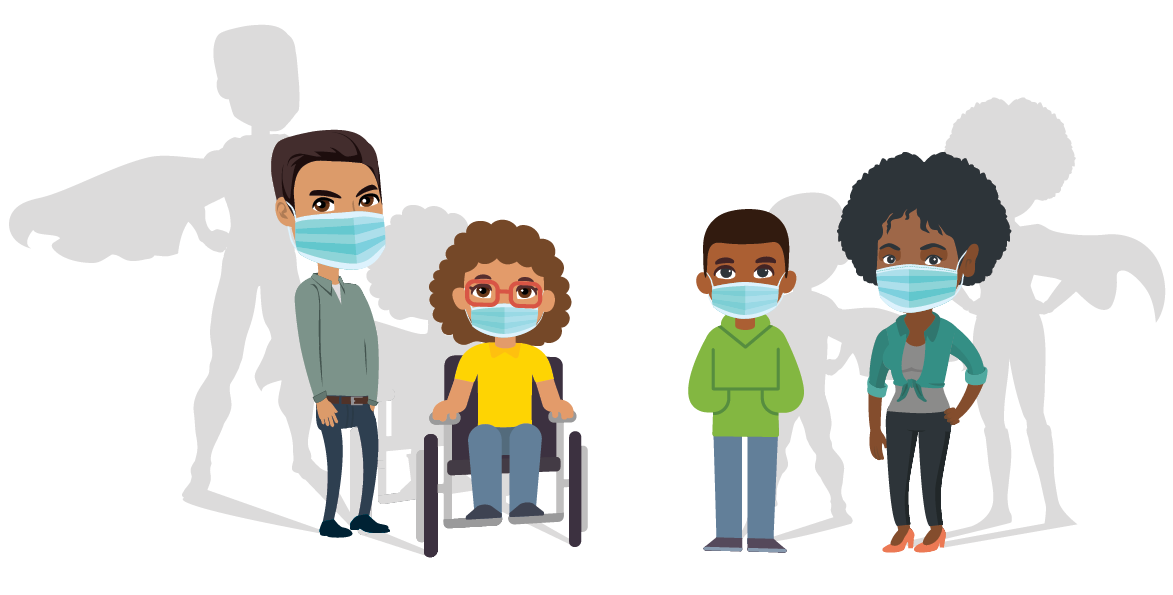Be A Hero! Prepare your kids for school during COVID-19

Prepare your kids for school during COVID-19
As a parent, you know your child looks to you to help them feel safe and secure. So it is important for you to teach your child about COVID-19, to help them feel comfortable, confident, and prepared!
Children and COVID-19
Based on current knowledge, most children who get COVID-19 show very few or no symptoms.
Some children, however, have developed a serious illness known as multisystem inflammatory syndrome (or MIS-C). Call your doctor or the emergency room if your child develops a fever, diarrhea or vomiting, a rash or changes in skin color, extreme tiredness, or trouble breathing.
Even if children don’t show any symptoms, they can still transmit COVID-19 to adults, including parents, grandparents, teachers, caregivers, and others. And COVID-19 in adults can cause serious illness or even death.
Preparing Your Child for School During COVID-19
Children will face many unexpected changes to their school routines because of COVID-19. Talk to your child about those changes and why they are important.
Encourage your child to ask questions. If you don’t know the answer, you and your child can look it up together!
Different schools may have different rules, and those rules may change.
- Closely monitor the policies for your child’s school throughout the COVID-19 pandemic.
- Even if you have negative feelings about the requirements, don’t complain about them when your child may be listening. This is especially important for helping your child to respect and comply with the rules at school.
- Talk to your child about the reasons for these policies and why it is important to follow the rules to keep others safe and healthy.
Schools may require masks or face coverings.
- When choosing masks for your child, make sure they fit properly. Masks with ear loops or elastic bands are usually easier for children than masks that tie behind the head.
- Beginning several days or weeks before school starts, practice wearing the mask at home. Make sure your child can put it on and take it off with no help. Have your child wear the mask for longer stretches of time each day. Practice wearing your mask at the same time!
- Make wearing the mask fun. Let your child choose from two appropriate options when they pick out their clothes for school.
- Pack an extra mask in a zip-top bag to send along with your child, in case the one they’re wearing gets wet or dirty.
- Wash fabric masks or face coverings after each day’s use. Throw away paper or disposable masks at the end of each day.
- Be a role model. Wear a mask yourself when you are in public.
Practice the prevention behaviors at home that your child should do at school.
- Wear a mask or face covering.
- Maintain physical distance from other people.
- Wash your hands often with soap and water.
- Clean and sanitize surfaces.
- Stay home as much as possible.
- Visit with family members and friends electronically, not face-to-face.
Be a hero!
These recommendations can help you to help your child feel more comfortable with changes at school. Because you have talked about them and practiced them at home, these behaviors will feel familiar and not scary or frustrating.
You will be a hero, and you’ll be preparing your child to be one, too!
M2362 (POD-07-20)
By David Buys, PhD, MSPH, CPH, Extension State Health Specialist; Alisha M. Hardman, PhD, CFLE, Extension Family Life Specialist; Melissa Tenhet, MS, Instructor and Director, Child Development and Family Studies Center; and Elizabeth Gregory North, Head, Agricultural Communications.
Copyright 2020 by Mississippi State University. All rights reserved. This publication may be copied and distributed without alteration for nonprofit educational purposes provided that credit is given to the Mississippi State University Extension Service.
Produced by Agricultural Communications.
Mississippi State University is an equal opportunity institution. Discrimination in university employment, programs, or activities based on race, color, ethnicity, sex, pregnancy, religion, national origin, disability, age, sexual orientation, genetic information, status as a U.S. veteran, or any other status protected by applicable law is prohibited. Questions about equal opportunity programs or compliance should be directed to the Office of Compliance and Integrity, 56 Morgan Avenue, P.O. 6044, Mississippi State, MS 39762, (662) 325-5839.
Extension Service of Mississippi State University, cooperating with U.S. Department of Agriculture. Published in furtherance of Acts of Congress, May 8 and June 30, 1914. GARY B. JACKSON, Director
The Mississippi State University Extension Service is working to ensure all web content is accessible to all users. If you need assistance accessing any of our content, please email the webteam or call 662-325-2262.






